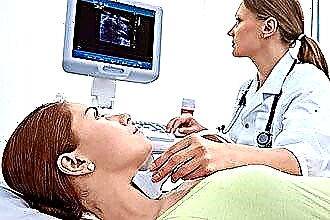If the baby in the process of breathing makes noisy, dull and wheezing sounds, this means that a critical amount of mucus has already formed in the trachea and bronchi. This is an extremely dangerous condition that threatens the life of a child. After all, mucus that does not find an outlet can clog the bronchi, and the crumb will simply suffocate. In this case, there is no time to find out the causes of the disease - the child needs to be urgently taken to the hospital. It should be noted that a hoarse cough in a child is often a sign that an inflammatory process is actively developing in the bronchi. However, there are a number of other factors that can cause exactly the same condition.
Where does hoarseness come from
 Always remember that if a child coughs hoarsely and has a hoarse voice, it should be shown to an experienced doctor as soon as possible. No self-medication using commercials, advice from friends and "grandmother's" recipes! Of course, parents should notice all the features of the cough (timbre, volume, intensity, and so on), navigate the alleged causes of its occurrence. This is necessary in order to describe to the doctor the most complete picture of the baby's illness.
Always remember that if a child coughs hoarsely and has a hoarse voice, it should be shown to an experienced doctor as soon as possible. No self-medication using commercials, advice from friends and "grandmother's" recipes! Of course, parents should notice all the features of the cough (timbre, volume, intensity, and so on), navigate the alleged causes of its occurrence. This is necessary in order to describe to the doctor the most complete picture of the baby's illness.
The child coughs and wheezes during coughing when the lower small bronchi are already clogged with mucus. Often the occurrence of such a condition is associated with some kind of cold-related disease. The phlegm does not cough up and accumulates in the bronchi - hence the characteristic sound when coughing. So, it can be argued that a child coughs with wheezing if harmful contents enter the respiratory tract.
Wheezing in the lungs, like coughing, are dry and moist. For example, dry wheezing is characteristic of bronchitis and bronchial asthma. But if the lungs begin to swell, the wheezing becomes wet with a musical timbre.
If a child has wheezing in his chest, he coughs and speaks in a hoarse voice, this indicates inflammation of the organ (or organs) of the respiratory system. After a series of tests and examinations, as a rule, it turns out that the baby suffers:
 pharyngitis;
pharyngitis;- laryngitis;
- tracheitis;
- bronchitis;
- pneumonia.
However, these symptoms can signal much more serious ailments - tuberculosis, emphysema, or lung cancer.
If a hoarse cough appears suddenly, and there are no additional symptoms, the cause could be the ingestion of a foreign object into the respiratory tract. The child could simply choke on food. In addition, there are times when a drink or even saliva gets "in the wrong throat." Very young children may try to swallow an object and choke on it.
If the cause of the hoarse cough is indeed in a foreign object, the baby will stop coughing only when the object is removed.
Associated symptoms
In most cases, a hoarse cough is not the only symptom. As a rule, it is supplemented by at least 2-3 other equally unpleasant signs. All these symptoms in combination draw the general picture of the disease and help the doctor establish the exact cause of the cough. After all, only after that he will be able to prescribe adequate and, most importantly, effective treatment.
 So, a child who has a wheezing cough may also suffer from:
So, a child who has a wheezing cough may also suffer from:
- high temperature, fever, chills, weakness, intoxication of the body;
- runny nose;
- inflammation of the larynx and its swelling;
- hoarseness of voice (sometimes - from its loss);
- tickling, tickling and other discomfort in the throat;
- Difficulty swallowing (a sign that your upper airways are inflamed)
- sensation of a foreign object stuck in the pharynx or larynx;
- wheezing breath.
It should be noted that obstructive bronchitis or bronchial asthma usually accompanies a wheezing cough. Its characteristic feature is wheezing wheezing on exhalation. Such sounds are the result of bronchospasm and swelling of the inner lining of the bronchi and bronchioles. Inside the latter, a very thick and viscous sputum forms, which practically does not separate. She fills the lumen of the bronchi.
In addition, it irritates nerve endings. And this, in turn, provokes an even stronger spasm of the lower bronchi and bronchioles. As a result, gas exchange in the lungs decreases, and respiratory failure increases. This situation requires urgent action.
A hoarse cough with acute laryngitis, bronchitis, or pneumonia
If a child has a barking cough, accompanied by wheezing and shortness of breath, not a minute should be wasted. These are very alarming signs that pose a danger to the life of the baby. Call an ambulance immediately. While the doctors are on the way, let the baby put its feet in warm water (this method can be used only if the body temperature is not high). What is it for? In order for the blood to drain from the larynx and flow to the feet. It is necessary to remove the puffiness at least a little. However, a slight improvement does not mean that you can cancel the medical call. The effect of this method is short-lived.
 If doctors suggest that you admit your child to the hospital, do not hesitate to agree. Swelling of the larynx is dangerous because it can increase very quickly and sharply. Therefore, with such symptoms, it is better to be in the place where, if necessary, they will provide emergency assistance and, if necessary, carry out resuscitation measures.
If doctors suggest that you admit your child to the hospital, do not hesitate to agree. Swelling of the larynx is dangerous because it can increase very quickly and sharply. Therefore, with such symptoms, it is better to be in the place where, if necessary, they will provide emergency assistance and, if necessary, carry out resuscitation measures.
Often, a hoarse voice and wheezing when coughing in a child are symptoms of bronchitis or pneumonia. These diseases almost always arise not on their own, but as a complication of the transferred viral infection. The fact that the disease is becoming more complicated is evidenced by the repeated rise in temperature.
If the baby has the listed symptoms, you need to immediately call the pediatrician at home. True, you can forget about the prospect of home treatment. Treatment of bronchitis usually takes place in a hospital.
When the cough becomes productive and the child begins to cough up well, the doctor will prescribe a sputum test. This is necessary in order to determine the causative agent of the disease and choose the most suitable medications to effectively combat it.
How to treat
Several traditional therapies can be used to relieve coughs, reduce swelling and sore throat, and improve coughing and voice restoration. However, they should in no way replace a visit to a doctor and medication. So, at home you can use:
- Inhalation. Let your child breathe hot steam. It is necessary to seat him over the source of steam and cover with a completely warm blanket. There are many home inhalation recipes. The most popular is steam inhalation from boiled potatoes. It can be cooked directly in the peel - in steam then
 more nutrients will go. Alternatively, you can take a teaspoon each of dried thyme, chamomile and sage, add water (1.5 liters) and brew. Cover the baby with a blanket over a saucepan with broth so that he inhales the steam emanating from him.
more nutrients will go. Alternatively, you can take a teaspoon each of dried thyme, chamomile and sage, add water (1.5 liters) and brew. Cover the baby with a blanket over a saucepan with broth so that he inhales the steam emanating from him. - Drink plenty of fluids. Increasing the volume of fluid will help speed up the elimination of toxic substances from the body and alleviate the symptoms of the disease. Lightly brewed tea with a slice of lemon or warm milk with the addition of natural honey are best suited.
- Warming ointments. To relieve a hoarse cough, it is recommended to rub the chest and back with special warming ointments (eg, Golden Star, Dr. Mom).
Let's summarize
First of all, let us emphasize that attempts to cure a cough on their own can cause significant damage to a child's health.It doesn't matter what you give your baby - drugs from advertising or folk remedies. Without knowing the exact diagnosis, you cannot self-medicate.
If a hoarse cough develops, you should immediately consult an experienced professional. Before prescribing certain drugs, he will send you and your child for tests and examinations. All this is needed to establish an accurate diagnosis and select the most effective treatment tactics.
With the sudden appearance of formidable additional symptoms (very high temperature, rapid breathing, changes in skin color, inability to change body position, difficulty breathing in or out), not a minute should be lost. Call an ambulance urgently.

 pharyngitis;
pharyngitis; more nutrients will go. Alternatively, you can take a teaspoon each of dried thyme, chamomile and sage, add water (1.5 liters) and brew. Cover the baby with a blanket over a saucepan with broth so that he inhales the steam emanating from him.
more nutrients will go. Alternatively, you can take a teaspoon each of dried thyme, chamomile and sage, add water (1.5 liters) and brew. Cover the baby with a blanket over a saucepan with broth so that he inhales the steam emanating from him.

